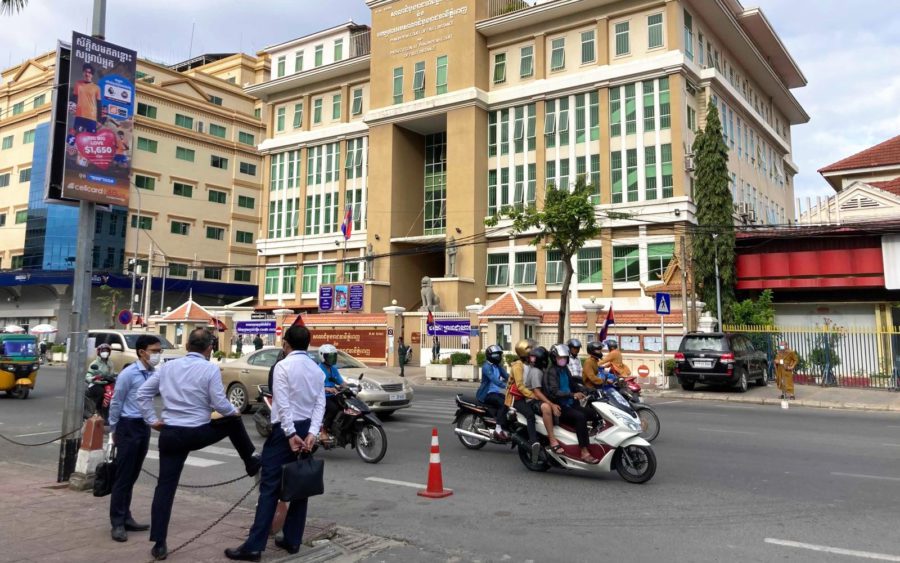As the mass trial of CNRP officials continued Thursday, National Police investigators called to testify repeatedly tried to avoid answering basic questions about how they built a case against defendants, claiming the process was “technical” and that revealing it could jeopardize national security.
Throughout the morning hearing, the defense pressed that central line of questioning of how police had identified lower-level suspects to be charged with various speech-related crimes. Those questions made up the focus of Thursday’s session, which featured testimony from investigators Pech Sotharath and Chan Darith, both of whom are witnesses in the case.
The two National Police officials are respectively the deputy director of the anti-terrorism and cross-border crimes unit, and the bureau chief of the procedure and investigation department.
The ongoing case against former CNRP leaders being heard in the Phnom Penh Municipal Court involves charges of incitement, plotting and inciting military personnel to disorder through the 2018 formation of the overseas Cambodia National Rescue Movement (CNRM). The charges against the banished opposition figures also point to critical comments made by former CNRP officials about the Covid-19 pandemic.
Discussion became increasingly tense during Thursday’s two-hour hearing — the sixth session of the trial against the former opposition — as the two police officials described the process of collecting information related to the creation of the so-called rescue movement. That information included video clips and other statements specifically found on the Facebook pages of party leaders Sam Rainsy and Mu Sochua, as well as other top CNRP figures.
Under questioning by deputy prosecutor Seng Heang, Darith told the court that police had in 2019 to 2020 found lower-level officials posting false or unverifiable information after the CNRM was created.
“The intention of creating such false information is to make people get angry with the government and then people will stop following the government,” Darith said. “This factor will have a serious impact on society.”
Darith said he was ordered to investigate connections between lower-level CNRP officials and seven of the court-dissolved party’s top leaders. Darith and the prosecution largely avoided a detailed account of that investigation, stating that it should be kept secret on the grounds of preserving national security.
Under questioning, Darith said the court had allowed police to investigate the telephone and internet communications of the accused, as well as their activity on social media.
When defense lawyer Chunthy asked whether the subsequent orders focused only on those seven top leaders or otherwise, and how the orders had been implemented, prosecutor Seng Heang interrupted his line of questioning to say that asking about the meaning of the orders would be a waste of time. Chunthy rejected that, saying the matter needed to be studied in detail.
Consulting judge Im Vannak jumped in and tried to find a compromise before repeating the question for Darith.
The police official then read out one of the orders, saying the investigating judge allowed investigators to listen through other means, such as phone-tapping, and extend that practice from one individual to another.
Casting doubts over the connections between his 12 clients who were present at the court, Chunthy asked: “From which connection point did you start with?”
He then clarified that he wanted to know specifically “which individual contacts who.”
Darith tried to avoid answering that.
“It is technical work and some are related to national security. I would like to not answer,” he said.
Chunthy didn’t accept that, saying the question should not be denied.
Deputy prosecutor Heang interrupted again, claiming the matter was related to the national security of the country and that some orders could not be shown because of that.
Chunthy rejected that, stating that evidence used to accuse his clients of crimes must be made clear.
At that point, judge Ros Piseth jumped in to say the case was complicated and to ask Chunthy to raise clearer questions and make it short. He also explained that it is illegal to conduct phone-tapping without a court order, but asked forgiveness for officer Darith for not answering the defense lawyer’s questions as Chunthy had wanted.
Chunthy kept questioning how authorities identified the individuals that made up the accused network, but Darith didn’t answer specifically, instead stating the case focused on a group of top leaders. Chunthy pressed the police official for more specifics on that group, but Darith again denied answering, stating the question was technical and needed to be kept secret.
Chunthy challenged that with the judge, saying the trial could not be secret. The judge tried to compromise again, saying this is Darith’s first time testifying and sometimes he was confused by the questions.
After more back-and-forth, Heang again pointed to the concept of national security to defend the concealment of police procedure.
“I accept that the trial is to find the truth, but some points cannot be shown. Every country has their secrets,” he said.
Judge Piseth also tried to explain the officer’s incomplete answers by saying the investigatory process was a technical one.
“I would like to clarify that police have their techniques and what they are doing is based on different skills [across departments], and they followed the order from the court,” the judge said.
But he acknowledged the police could not clarify those techniques, and asked a defense lawyer to raise that point within his concluding remarks.
With that, judge Piseth set the date of the next hearing for January 6.












